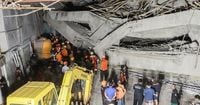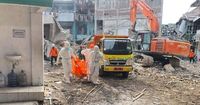In the small town of Sidoarjo, East Java, Indonesia, what began as an ordinary afternoon of prayers at the Al Khoziny Islamic boarding school on September 29, 2025, turned into a tragedy that has gripped the nation. The collapse of a prayer hall, packed with hundreds of teenage students, has left the country mourning and searching for answers as the death toll continues to climb.
According to the Associated Press, the structure, which fell on top of students mostly aged between 12 and 19, was undergoing illegal construction work at the time of the incident. Authorities have confirmed that two additional levels had been added to the original two-story building without the necessary permits—a violation of Indonesia's strict 2002 Building Construction code. This lack of oversight and adherence to safety standards proved catastrophic.
"The construction couldn’t support the load while the concrete was pouring (to build) the third floor because it didn't meet standards and the whole 800 square meters (8,600 square feet) construction collapsed," Mudji Irmawan, a construction expert from the Tenth November Institute of Technology, explained to the Associated Press. He further emphasized that students should never have been allowed inside a building still under construction.
The collapse occurred during afternoon prayers, a time when the hall was filled to capacity. The initial chaos quickly gave way to a desperate rescue operation. Rescuers, using everything from jackhammers to their bare hands, worked tirelessly to sift through the debris. By the weekend following the disaster, rescue teams had recovered 23 bodies, but the grim tally rose as the days wore on. As of October 5, 2025, the confirmed death toll had reached 45, as reported by multiple outlets including Reuters and the Associated Press. The search for missing students continued for a seventh day, with cranes deployed to excavate the debris and search and evacuation efforts reported to be 60% complete.
For the families of the missing, the wait was agonizing. Rescuers called out the boys' names and used sensors to detect any movement, but by October 3, after failing to find signs of life, parents gave permission for the use of heavy equipment. Despite these efforts, the rescue teams found no survivors among those still trapped beneath the rubble.
Describing the scene, Reuters reported that search and rescue officers dug tunnels through the remains of the building, while others used advanced equipment in a last-ditch effort to save lives. The search was expected to finish by October 6, 2025, but the emotional scars left on the community will take far longer to heal.
Only one student managed to escape the disaster unscathed. In total, 95 students were treated for injuries and later released, while eight others suffered serious wounds and remained hospitalized as of October 5. The magnitude of the tragedy has prompted widespread anger and soul-searching across Indonesia, a country with approximately 42,000 pesantren (Islamic boarding schools) serving 7 million students, according to the religious affairs ministry.
The Al Khoziny school, a century-old institution, is locally respected, and its caretaker, Abdus Salam Mujib, is a well-known Islamic cleric in East Java. In a rare public appearance a day after the incident, Mujib offered a public apology, saying, "This is indeed God’s will, so we must all be patient, and may God replace it with goodness, with something much better. We must be confident that God will reward those affected by this incident with great rewards." His words, while meant to comfort, could not quell the rising frustration over illegal construction practices that many believe contributed directly to the tragedy.
Subandi, the Sidoarjo district chief, confirmed to the Associated Press that the school’s management had not applied for the required permit before starting construction. "Many buildings, including traditional boarding school extensions, in non-urban areas were built without a permit," he noted, highlighting a systemic issue that extends far beyond a single institution.
Indonesia's 2002 Building Construction code is clear: permits must be issued by the relevant authorities prior to any construction. Violators face steep penalties, including fines of up to 8 billion rupiah (nearly $500,000) and imprisonment for up to 15 years if violations result in death. In this case, the consequences have been devastatingly real, and calls for accountability are growing louder.
Criminal investigations involving Muslim clerics are notoriously sensitive in Indonesia, the world’s largest Muslim-majority nation. Since the collapse, school officials have largely remained silent, but law enforcement has promised action. "We will investigate this case thoroughly," East Java Police Chief Nanang Avianto stated on October 5. "Our investigation also requires guidance from a team of construction experts to determine whether negligence by the school led to the deaths."
The broader context of the disaster cannot be ignored. Indonesia’s pesantren system is vast, and many schools—especially in rural areas—lack the resources or oversight to ensure that buildings meet safety standards. The tragedy at Al Khoziny has reignited debate over the enforcement of building regulations and the need for greater government intervention to protect students.
For now, the focus remains on the victims and their families. The rescue operation, which began with hope, has become a somber recovery mission. As cranes remove the last of the debris and the final tally of victims is confirmed, Indonesia faces a reckoning with the practices that allowed such a catastrophe to occur.
There are no easy answers, and the pain of loss is felt acutely in Sidoarjo and beyond. The hope is that this tragedy will spur meaningful change—stricter enforcement of building codes, greater transparency, and a renewed commitment to the safety of Indonesia’s millions of students. For those who lost loved ones, no measure of justice can bring them back, but perhaps their memory will serve as a catalyst for a safer future.



